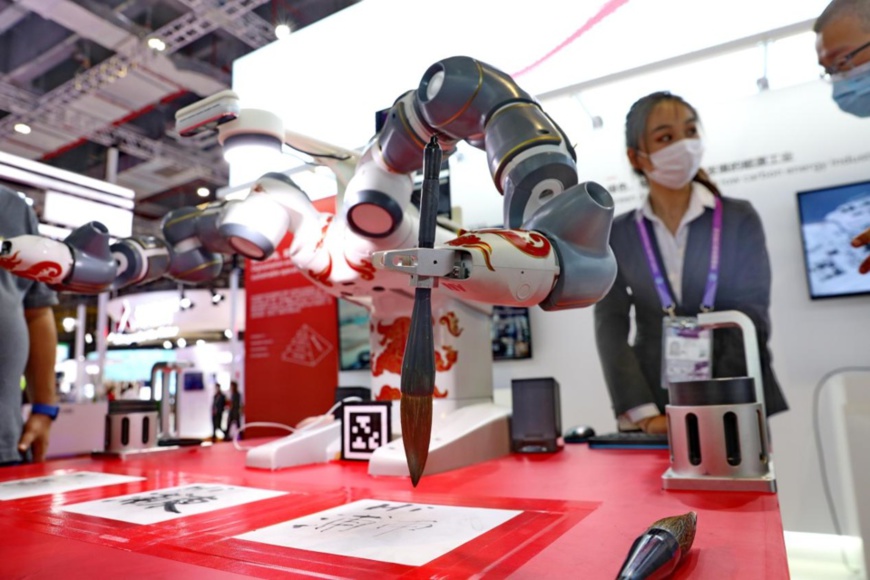By Li Rui, People’s Daily

An artificially intelligent robot impresses visitors with its Chinese calligraphy skills at the fourth China International Import Expo held in the National Exhibition and Convention Center (Shanghai) in east China’s Shanghai, Nov. 6, 2021. (Photo by Xu Congjun/People’s Daily Online)
In the workshop of Shandong SIASUN Industrial Software Research Institute Co., Ltd., a high-tech enterprise in Jinan city, east China’s Shandong province, various kinds of robots work in an orderly manner, among which some can flexibly rotate their arms, accurately grab components and then put them on lathe with their human finger-like pliers.
The company, based in the Artificial Intelligence (AI) Building in Jinan Innovation Zone, has developed a smart system that can realize overall control of robots and automated production lines, thus improving the production efficiency and level of intelligentization of the workshop, according to Qi Tiancheng, deputy head of the major project and strategic development department of the company, which specializes in the development of smart manufacturing-related basic software and key components.
Shandong SIASUN Industrial Software Research Institute Co., Ltd. is not the only high-tech company operating from office in the AI Building.
In recent years, Jinan city has won approval for building a national pioneer zone for the innovation and application of AI and a national pilot zone for new-generation AI innovation and development.
At present, the city is making efforts to build an “AI island” to stimulate the construction of the two zones.
“AI Building is the core of the main area of the ‘AI island’. It attracts and gathers top AI companies for comprehensive deployment of cutting-edge AI applications,” said Peng Shaoyi, head of the industrial development department of the development center of Qilu Softpark, an important industrial park in Jinan Innovation Zone.
Qilu Softpark serves as a demonstration zone of the “AI island”, according to Peng, who disclosed that the city will build AI experience hall and AI application demonstration facilities in the industrial park, including financial service facility and business districts empowered by smart technologies.
The “AI island” will also cover Qilu sci-tech innovation corridor and Jinan smart manufacturing corridor, two key projects launched by the city to enhance its role in leading regional sci-tech innovation and manufacturing development, according to Zhao Wei, deputy director of the intelligent equipment industry development center under the management committee of the Jinan Innovation Zone.
The construction of the China computing valley, a key part of the corridors as well as a major and key project launched by Jinan to build a new highland of global computing industry, is in full swing. The project mainly consists of an industrial park and a sci-tech park.
The industrial park of China computing valley is expected to be completed and put into operation at the end of this year, Zhao said.
“The curtain walls of the plants for the first phase of the industrial park have been basically completed, and the main structure of the buildings for the second phase of the project was capped,” Zhao told People’s Daily when referring to the construction of the industrial park, which is a 20-minute car ride from the Qilu Softpark.
The industrial park, together with the sci-tech park, will form an industrial cluster featuring in-depth integration of AI and the real economy, according to Zhao, who disclosed that more than 10 enterprises have decided to set up offices in the industrial park.
“Shandong province is home to more than 600 enterprises engaged in AI or related industries and has built a sound foundation and ecosystem for AI industry,” said Ji Peide, head of the Jinan municipal bureau of industry and information technology.
Considering AI industry as one of the key sectors for breakthroughs during China’s 14th Five-Year Plan period (2021-2025), Jinan endeavors to create leading areas for demonstration of AI innovation and industrial cluster and accumulate experience for innovative development of AI industry, according to Ji.
As an important part of new infrastructure, AI infrastructure has come under the spotlight as it is crucial to the role of AI industry in empowering economic and social development and serves as a strong driver of the development of digital economy-related industries as well as the application of smart technologies.
A report released by China Academy of Information and Communications Technology (CAICT) in January this year provided a systematic analysis of the latest trends in the development of AI infrastructure in China in 2021 from three aspects: data set, computing power, and open-source platform.
AI infrastructure is a special system of service facilities and capabilities designed to realize and expand smart economy and build a society with a high level of intelligentization in all sectors, according to the report.
Based on a basic capability platform featuring the three factors of computing power, data, and algorithm, AI infrastructure empowers intelligent transformation of major sectors, such as manufacturing, health, and transport through open application platforms and other means, said the report.
China’s AI infrastructure is still in its infancy, and enjoys rapid growth and huge potential for bigger role and greater value, pointed out the report.
The company, based in the Artificial Intelligence (AI) Building in Jinan Innovation Zone, has developed a smart system that can realize overall control of robots and automated production lines, thus improving the production efficiency and level of intelligentization of the workshop, according to Qi Tiancheng, deputy head of the major project and strategic development department of the company, which specializes in the development of smart manufacturing-related basic software and key components.
Shandong SIASUN Industrial Software Research Institute Co., Ltd. is not the only high-tech company operating from office in the AI Building.
In recent years, Jinan city has won approval for building a national pioneer zone for the innovation and application of AI and a national pilot zone for new-generation AI innovation and development.
At present, the city is making efforts to build an “AI island” to stimulate the construction of the two zones.
“AI Building is the core of the main area of the ‘AI island’. It attracts and gathers top AI companies for comprehensive deployment of cutting-edge AI applications,” said Peng Shaoyi, head of the industrial development department of the development center of Qilu Softpark, an important industrial park in Jinan Innovation Zone.
Qilu Softpark serves as a demonstration zone of the “AI island”, according to Peng, who disclosed that the city will build AI experience hall and AI application demonstration facilities in the industrial park, including financial service facility and business districts empowered by smart technologies.
The “AI island” will also cover Qilu sci-tech innovation corridor and Jinan smart manufacturing corridor, two key projects launched by the city to enhance its role in leading regional sci-tech innovation and manufacturing development, according to Zhao Wei, deputy director of the intelligent equipment industry development center under the management committee of the Jinan Innovation Zone.
The construction of the China computing valley, a key part of the corridors as well as a major and key project launched by Jinan to build a new highland of global computing industry, is in full swing. The project mainly consists of an industrial park and a sci-tech park.
The industrial park of China computing valley is expected to be completed and put into operation at the end of this year, Zhao said.
“The curtain walls of the plants for the first phase of the industrial park have been basically completed, and the main structure of the buildings for the second phase of the project was capped,” Zhao told People’s Daily when referring to the construction of the industrial park, which is a 20-minute car ride from the Qilu Softpark.
The industrial park, together with the sci-tech park, will form an industrial cluster featuring in-depth integration of AI and the real economy, according to Zhao, who disclosed that more than 10 enterprises have decided to set up offices in the industrial park.
“Shandong province is home to more than 600 enterprises engaged in AI or related industries and has built a sound foundation and ecosystem for AI industry,” said Ji Peide, head of the Jinan municipal bureau of industry and information technology.
Considering AI industry as one of the key sectors for breakthroughs during China’s 14th Five-Year Plan period (2021-2025), Jinan endeavors to create leading areas for demonstration of AI innovation and industrial cluster and accumulate experience for innovative development of AI industry, according to Ji.
As an important part of new infrastructure, AI infrastructure has come under the spotlight as it is crucial to the role of AI industry in empowering economic and social development and serves as a strong driver of the development of digital economy-related industries as well as the application of smart technologies.
A report released by China Academy of Information and Communications Technology (CAICT) in January this year provided a systematic analysis of the latest trends in the development of AI infrastructure in China in 2021 from three aspects: data set, computing power, and open-source platform.
AI infrastructure is a special system of service facilities and capabilities designed to realize and expand smart economy and build a society with a high level of intelligentization in all sectors, according to the report.
Based on a basic capability platform featuring the three factors of computing power, data, and algorithm, AI infrastructure empowers intelligent transformation of major sectors, such as manufacturing, health, and transport through open application platforms and other means, said the report.
China’s AI infrastructure is still in its infancy, and enjoys rapid growth and huge potential for bigger role and greater value, pointed out the report.
 Menu
Menu
 East China’s Jinan endeavors to spur growth of AI industry
East China’s Jinan endeavors to spur growth of AI industry
















